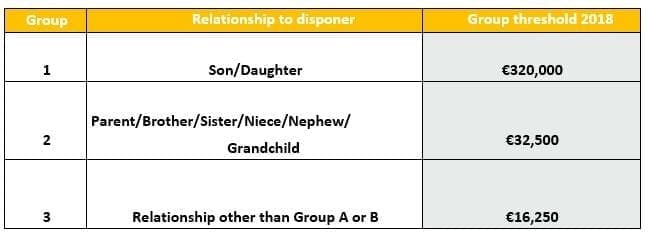Introduction – The many purposes for Life Insurance
Life Insurance/ Life Cover can be taken out for various reasons and to protect against and plan for a variety of scenarios, as a result of the death of the life assured. Often people are unaware of the value of Life Cover until they unfortunately see it first hand or through a family member or close friend. A life insurance contract can be a vehicle in terms of – Family Protection, Covering borrowings e.g mortgage, in a business scenario to cover shareholders or key employees or to provide funds to pay Inheritance Tax. Whatever purpose the life cover is for, a properly formalised plan for life insurance solidified through your will is prudent financial and estate planning.
Forward thinking financial planning and succession/estate planning are inextricably linked. This article focuses on Life Cover’s applicability to Inheritance Tax Planning. It is of the upmost importance that when you take out life insurance you know what you own and why you own it, this is never truer than in this scenario.
Inheritance Tax Planning
When you’re formulating your will with your solicitor it may become apparent that the beneficiaries of your estate will have an inheritance tax liability. A fundamental part of Estate Planning for many people can involve considering the inheritance tax liability the beneficiaries of their will and estate will have upon their death. This is not something that only the very wealthy have to consider. There are a lot of factors which influence this scenario, for example having a partner who you’re not married to, as the beneficiary of your estate, or only one child and a large estate or that you would like to leave parts of or your entire estate to a niece, nephew or even a neighbour or friend. As shown in the table at the outset of this article depending on their familial relationship to you and the size of the asset or assets passed the beneficiary may be subject to a significant inheritance tax liability, as their tax free threshold varies considerably.
A heavy inheritance tax bill is not the preferable scenario envisaged by the person passing on the assets or the party or parties receiving the assets. Your children for example could have an inheritance tax liability upon your death. As the value of assets passing to them as per your will, may exceed their tax free threshold which currently stands at 320,000. They will have a tax bill of 33% of the excess on assets which exceed this. When the asset transferred is a physical property and its value is significantly above the threshold or pushes assets being passed over the threshold this can become particularly problematic. An Inheritance tax bill of 33% on the excess over the threshold will be due and the property may have to be sold in order to generate the liquidity to pay this bill. This is not a scenario either parties want to see occur, especially if it concerns the family home.
Whole of Life Policy – Providing the funds to pay Inheritance Tax Bill
This is where a life insurance policy can come into play, to plan for this eventuality. A Section 72 Whole of Life Policy is a revenue approved contract which can be taken out to provide the funds to pay the Inheritance Tax. The policy is a whole of life policy so will pay out whenever death occurs it does not have a set term. This life policy is an excellent vehicle to plan for the passing of assets as per a persons will, while having protection in place to make sure the beneficiary/ies are not hit with a sizeable and in some cases unmanageable Inheritance Tax Bill, when their parent or settlor passes away and their assets pass to them. It is very much part of prudent financial and estate planning and shows how the life policy in this scenario when formalised correctly can provide welcome and much needed funds. This scenario is a clear illustration of how estate planning and life insurance can be interwoven to ensure all parties and the estate itself are protected.
Conclusion
Properly organised and formalised life insurance plans can be important vehicles to ensure the life assured wishes are executed in a seamless way, in often turbulent or traumatic times. In the Inheritance tax scenario a life policy is a forward looking plan to manage the estate and protect the beneficiaries from an eventual inheritance tax bill. A life policy can be used in a variety of scenarios and when formalised by a will is an excellent step toward formalised estate planning. Your life policy or policies should form part of your overall financial & estate planning, and in the Inheritance Tax Planning scenario vehicle of ensuring your wishes are enabled to be executed in the manner you envisaged, without creating a difficult liability for the beneficiaries.


 Dylan has been working in Financial Services for the last 4 years and also has a background in law. He is a financial planner with Niall G Lynch Insurance Brokers dedicated to delivering on the brokerages ethos of client focused financial planning and guidance.
Dylan has been working in Financial Services for the last 4 years and also has a background in law. He is a financial planner with Niall G Lynch Insurance Brokers dedicated to delivering on the brokerages ethos of client focused financial planning and guidance.
Recent Comments